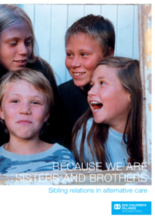This publication by SOS Children’s Villages International brings together research findings, learning and policy recommendations about sibling relations in alternative care gathered from the experiences of five different SOS Children’s Villages associations. The SOS Children’s Villages associations in Germany, Austria, France, Italy, and Spain worked together to develop the content of this publication, in cooperation with external experts and academic institutions. The overall purpose of the report is to draw attention to the importance of sibling relations and contribute knowledge and expertise to the relatively new field of research concerning siblings in alternative care. The report begins with an article, Siblings Seen Through the Lens of Children’s Rights by Maria Herczog, President of Eurochild and member of the UN Committee on the Rights of the Child, explaining what the UN Convention on the Rights of the Child and the Guidelines for the Alternative Care of Children say about the issue of siblings as well as the importance of ensuring that sibling relationships are given all due consideration when reforming national care systems.
Siblinghood through History and Research gives a summary of historical, sociological, and psychological research on siblinghood carried out in France and Belgium for SOS Children’s villages France. Siblings Relations in Challenging Family Constellations examines what role sibling relations play in families exposed to greater stress. Facts and Figures on Children and Siblings in Alternative Care introduces the legal framework for alternative care and youth welfare systems in the five countries as well as data on children and their siblings in alternative care. Understanding Sibling Relationships in Alternative Care captures the research project jointly carried out by the national SOS Children’s Villages associations in Austria and Germany and the University of Koblenz in an attempt to better understand sibling children who are place in alternative care.
The report also provides recommendations derived from study findings of these articles, summing up what has to be achieved in order to support siblings in alternative care in developing their relationship, as well as sharing information on risk and resources of sibling relationships in alternative care, educational challenges for caring for siblings, and basic requirements for carers to support siblings. Lastly, an article produced by SOS Children’s Villages Spain, Living as a Sibling in Alternative Care: Voices of Children and Young People presents the opinions of children and youth regarding the importance of and need for non-separation of siblings in alternative care.
©SOS Children's Villages International

